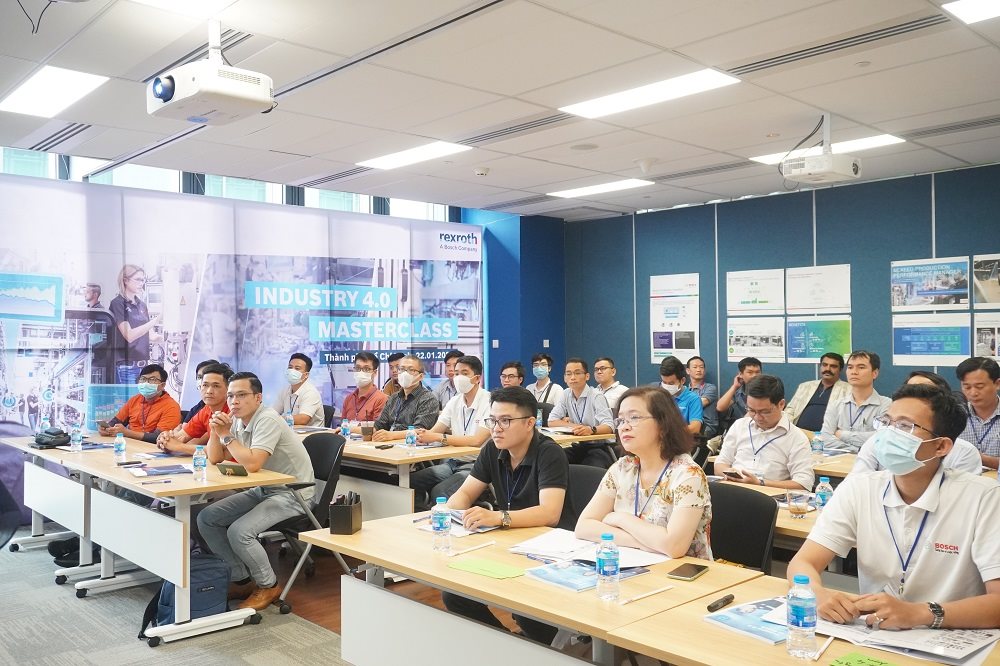Over 20 years of making its first footprint in Vietnam since 1994, Bosch Vietnam has grown strongly and become a massive enterprise with offices in Ho Chi Minh City, Hanoi, Da Nang and a Powertrain Solutions Plant in Dong Nai Province. In addition, Bosch also operates a center for Research and Development for software engineering and business solutions (Robert Bosch Engineering & Business Solutions Vietnam Co., Ltd.) and Automotive Research & Development Center in Ho Chi Minh City.
Robert Bosch engineering Vietnam (RBVH) was established in 2010 with a vision of low-cost engineering support center for Bosch group. However, in the last 10 years RBVH has come a long way from just being a support center to a leading development hub for Bosch group globally. The focused approach of Bosch Vietnam and availability of skilled workforce in Vietnam allow RBVH to be at the forefront of innovation and digital transformation. Back in 2014, when German Chancellor Angela Merkel formed Industry 4.0 as the growth driver for manufacturing, Bosch was among the first few to devise a strategy to adapt it.

Bosch is an early adopter of Internet of Things and is already on the path of transforming itself as an IoT company by 2025. Bosch identifies Industry 4.0, Integrated campus using IoT as the growth driver for the world and ASEAN. Here in Vietnam Bosch started setting up teams to work on these solutions as early as 2016. As of now at Bosch engineering Vietnam, more than 50 engineers work on product and solution for Industry 4.0 and Integrated campus. This talented pool of engineers is trained by Bosch experts in India and Germany for various skills required for developing and delivering solution for IoT and digital transformation.
Mr. Baskaran, Managing Director of RBVH, defines the vision of his organization as becoming the digital innovation hub within ASEAN for Bosch group and its global customers while creating value for its employees and Vietnamese people.
When asked, Aravind H S, head of digital practice at Bosch engineering Vietnam, explains that his team is working on solutions and products for digital manufacturing and Integrated Campus. For him, the future of manufacturing will be dependent on how we optimize manufacturing value stream using different kinds of data that get generated into the process. He sees edge computing, machine learning and artificial intelligence as the growth driver for factories of the future. He explains, in factories collecting different kinds of products and process data is the first step of digital journey and for this his team has already developed a solution called Device Bridge which can connect and collect data from a range of control systems and sensors. As the next step, he suggests factories to implement manufacturing operation management and condition monitoring for real time data visualization and action using Nexeed Industrial application system from Bosch global portfolio of solutions for connected industry.
Many countries in ASEAN and Vietnam specifically are large export driven economies. He expects a good demand for forecasting, planning and scheduling supported by digital supply chain tools for real time tracking of assets and goods. Many Bosch factories around the globe are already using these solutions for Industry 4.0 and are benefitting from better quality at reduced cost with increased machine availability while keeping Bosch Production System (BPS) at its core.
Nihal Ranjan, Senior Lead consultant at Bosch, emphasizes on improving quality and manufacturing efficiency by collecting and analyzing right data. He suggests organizations to create a robust data strategy to collect relevant data rather than all the data. According to him, Bosch is already benefitting immensely from data analytics project and he predicts upward swing in this trend for Bosch and other global companies. He suggests extensive use of Auto ML for predictive maintenance and vision solutions using machine learning for various product verification and validation in manufacturing.










